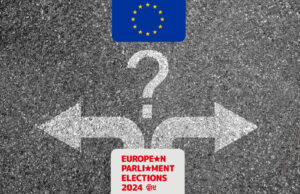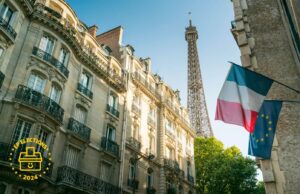The legislative electoral defeat of the National Rally and its allies is excellent news. First, the Bardella/Le Pen camp’s goal to impose a racist purge on the country and crush the social movement could not secure a parliamentary majority. Also, the halt to its electoral rise shows that the country’s far-right drift is not inevitable.
The third place of the far-right party National Rally (RN) in the second round of the legislative snap election in France on July 7 after dominating the first round came largely as a surprise. It was outperformed by the New Popular Front (NFP, Nouveau Front Populaire), which came in first, and by President Macron’s camp, which came in second. So what happened? The reasons are quite simple. Between the two election rounds, the momentum shifted from the most reactionary elements of the population to the progressive elements, supporting the NFP. Jordan Bardella’s lacklustre performance in the televised debates and the dismaying profiles of RN’s candidates in nearly a hundred constituencies helped a great deal. Clearly, they weren’t ready. The intense politicisation that has shaken the country over the past three weeks, the daily discussions and the passionate interest in current affairs has also led millions of people, who were previously politically passive, to take a stand against the far right.
We were repeated that the radical elements in the left-wing NFP coalition (LFI — Unbowed France, La France Insoumise) would repel voters and cause the alliance to lose. The exact opposite happened. Of course, political unity and the agreement signed under grassroots pressure were decisive, enabling to thwart most attempts at division. But it also made way for the vast, deep-running mobilisation of voters on the left, as well as of thousands of collectives and associations, and even of the CGT making the historic decision of taking the electoral campaign into companies and public services.
This momentum was so powerful that it even shook and rattled Macron’s camp at the government, even though it had shown complacency with RN’s ideas. Three weeks ago, they were saying: rather Hitler than the Popular Front.1 A fortnight ago, they had however to change their tune. Yet, calling to vote for the New Popular Front was still out of the question, because of demonic conspiracies supposedly orchestrated by LFI. A week ago, with the left having already withdrawn from all the constituencies where it finished third in order to beat the RN, the Macronists finally relented and withdrew their candidates as well in the constituencies where those had arrived in third position. In reality, the affluent classes that form Macronism’s social base took fright and called on the working classes committed to the left to come to their rescue. The latter did not hesitate for a second and took up the leadership in the fight against the far right, despite the long years of political violence, slander and anti-social measures that they have endured.
So Where Are We Now?
Popular mobilisation has already accomplished a lot with this electoral victory, but if it stops here, it will have achieved nothing. The NFP’s most unreliable leading figures, such as Glucksmann, Hollande and others, are already negotiating the formation of a coalition government with the Macronists; at the very least, they insist that the NFP cannot govern without eliminating several key measures from its programme. They will do everything in their power to ensure that the left does not challenge the powers of capital, that it sides with the system. Of course, such a strategy would inevitably lead to the demobilisation of the people and, consequently, to its systematic corollary, which is the further rise of the RN (and perhaps its victory in the 2027 presidential election). This must be avoided at all costs!
For their part, President Macron’s allies are also considering the possibility of a right-wing coalition after the election’s results. This is even more threatening.
We need to move forwards. In the short term, we need to send out clear signals of social progress: repeal of the pension reform, an increase in the minimum wage, price freezes. Secondly, we need to involve the millions of people who live in our country in the development of a new system of property ownership and democratic decision-making, where power belongs to the many. This must involve taking over the Presidency of the Republic and convening a constituent assembly. Only then will we have achieved a decisive victory, because a people in revolution sees their strength multiply tenfold.
In the meantime, the fight for these demands cannot be exclusively parliamentary or ministerial. If, tomorrow, the government wears the colours of the Popular Front, we must support it and enable it to smash the dictatorship of money. If, on the other hand, opportunists of all kinds manage to circumvent the result of the ballot and form a liberal government, it will have to be forced to give up.
The voting ballot is one weapon in this battle. Street demonstrations, boycotts, traffic circle occupations (a strategy massively used by the movement of the Yellow Jackets in 2019), strikes (including in the context of the Olympic Games) and petitioning2 are others. The local Popular Front committees, which came into being during the election campaign, can provide valuable support.
Let’s fight back!
References
1 The slogan “rather Hitler than the Popular Front” was the slogan of the French Right in the 1930s. This shows the temptation of the current Right (Macron & LR) to revive this legacy.
2 This is a common mobilisation method which describes the act of circulating a text and signing it collectively before publishing it and submitting it to the government.
Cover: Republic Square in Paris, election night (7 July 2024). Photo source: Nos Révolutions.



